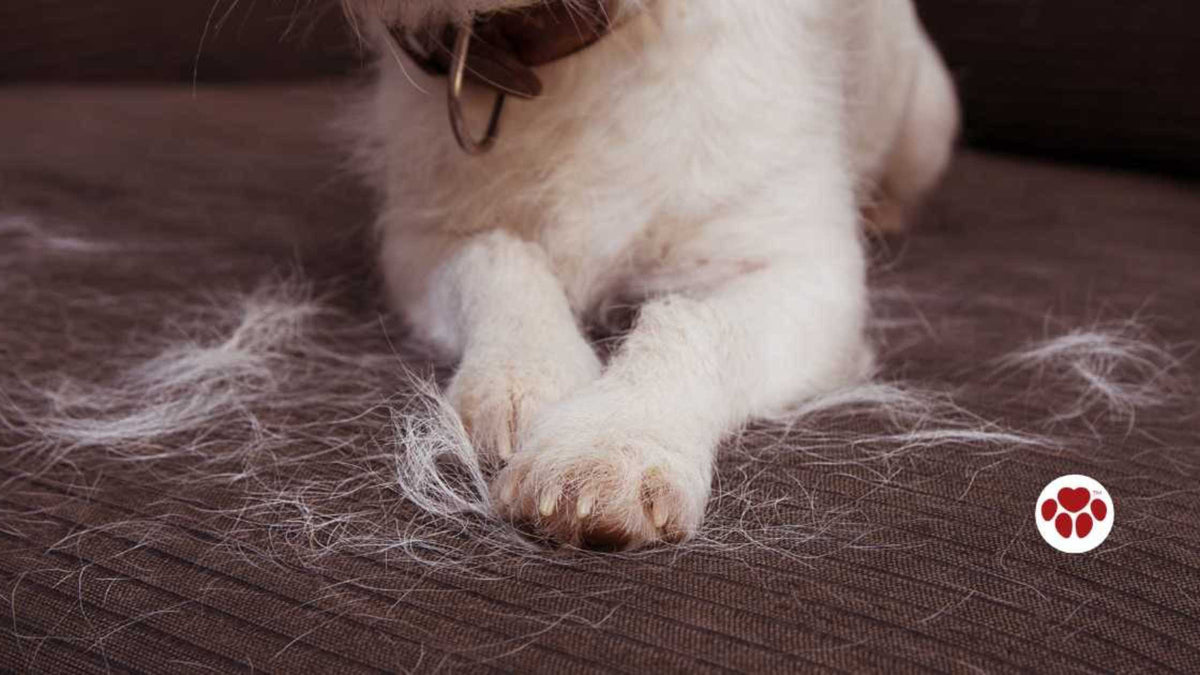
Effective Dog Hair Loss Home Remedies
|
|
Time to read 4 min
|
|
Time to read 4 min
Whether it's excessive hair on your furniture, clothes covered in fur, or endless vacuuming sessions, dealing with dog shedding can be frustrating.
Table of Content
Dog hair loss, also known as alopecia, can be a common issue that affects many breeds. It is important to understand the different types of hair loss and the underlying causes in order to effectively address the problem. Hair loss in dogs can be categorized into two types: primary and secondary. Primary hair loss refers to hair loss that occurs directly on the skin, while secondary hair loss is a result of an underlying condition or disease.
Hair loss can manifest itself in various ways, including patchy or generalized hair loss, thinning of the coat, or excessive shedding. It can be caused by a variety of factors, such as allergies, hormonal imbalances, parasites, skin infections, or nutritional deficiencies. Identifying the cause of your dog's hair loss is crucial in determining the most appropriate treatment.
Allergies, such as flea allergy dermatitis or food allergies, are a common culprit. Flea bites can cause intense itching and lead to hair loss, while certain food ingredients can trigger allergic reactions in sensitive dogs. Read “Say Goodbye to Fleas: Effective Home Remedies for Your Pets.”
Hormonal imbalances, such as hypothyroidism or Cushing's disease, can also result in hair loss. These conditions affect the normal functioning of the endocrine system and can disrupt the growth cycle of the hair follicles.
Read about “Navigating Cushing's Disease: How CBD Oil Can Benefit Dogs in the Battle ”.
Parasitic infestations, such as mange or ringworm, can cause hair loss in dogs. Read “Natural Solutions for Canine Mange.”
Skin infections, such as bacterial or fungal infections, can also lead to hair loss. These infections can cause inflammation and damage to the hair follicles, resulting in hair loss or thinning of the coat. Read “Effective Remedies to Treating Dog Hot Spots at Home.”
Nutritional deficiencies, particularly in essential fatty acids and certain vitamins, can contribute to poor coat condition and increased shedding.
Now that we have a better understanding of dog hair loss and its common causes, let's explore some effective home remedies that can help reduce shedding and promote a healthy coat for your furry friend.
A well-balanced diet plays a crucial role in maintaining a healthy coat and minimizing hair loss in dogs. Ensure that your dog's diet includes high-quality protein sources, such as lean meats or fish, to support the growth and maintenance of healthy hair. Additionally, incorporating omega-3 fatty acids, found in fish oil or flaxseed oil, can help improve the condition of your dog's skin and coat (Mueller, R., et al., 2004)
Regular grooming is essential for managing shedding in dogs. Brushing your dog's coat on a daily basis helps remove loose hair and prevents it from ending up all over your house. Use a deshedding tool or a slicker brush specifically designed for your dog's coat type to effectively remove loose hair and reduce shedding. Additionally, frequent bathing with a gentle shampoo can help keep your dog's skin healthy and minimize shedding. Avoid overdoing it as excessive grooming may cause hair loss as well (Moriello, K., 2018).
Certain natural supplements can help promote hair growth and improve the overall condition of your dog's coat. Biotin, a B-vitamin, is known for its role in promoting healthy hair and skin. Adding a biotin supplement to your dog's diet can help strengthen the hair follicles and reduce shedding. The study of Frigg, M., Schulze, J., & Völker, L. (1989) concluded that “Biotin treatment effectively improves or cures symptoms in 60% of dogs with fur and skin conditions, with varying responses across different breeds.” Other supplements, such as fish oil or coconut oil, can also provide essential nutrients and promote a healthy coat.
Essential oils have gained popularity for their therapeutic properties in humans, but they can also benefit dogs (Naccari, V., et al., 2017). Some essential oils, such as lavender or chamomile, have calming and soothing effects on the skin, reducing itchiness and inflammation. Others, like rosemary or cedarwood, can stimulate hair growth and improve the condition of the coat. However, it is important to use essential oils in moderation and always dilute them properly before applying them to your dog's skin.
If your dog's hair loss is caused by an underlying health condition, it is important to address the root cause in order to effectively manage shedding. Consult with your veterinarian to identify and treat any allergies, hormonal imbalances, or infections that may be contributing to hair loss. Your vet may recommend specific medications, topical treatments, or dietary changes to address the underlying condition and promote hair regrowth.
While home remedies can be effective in managing mild cases of dog hair loss, it is important to seek veterinary advice if the problem persists or worsens. Your veterinarian will be able to conduct a thorough examination, perform diagnostic tests if necessary, and recommend appropriate treatment options based on the underlying cause of the hair loss. In some cases, prescription medications or specialized treatments may be required to effectively manage the problem.
Dealing with dog shedding can be a challenge, but with the right approach, you can minimize hair loss and keep your dog's coat healthy and lustrous. By understanding the causes of hair loss, implementing dietary changes, practicing proper grooming techniques, and using natural remedies, you can effectively manage shedding in your furry friend.
However, it is important to consult with a veterinarian if the problem persists or if you suspect an underlying health condition. Say goodbye to shedding and hello to a cleaner home by implementing these proven home remedies for dog hair loss!
